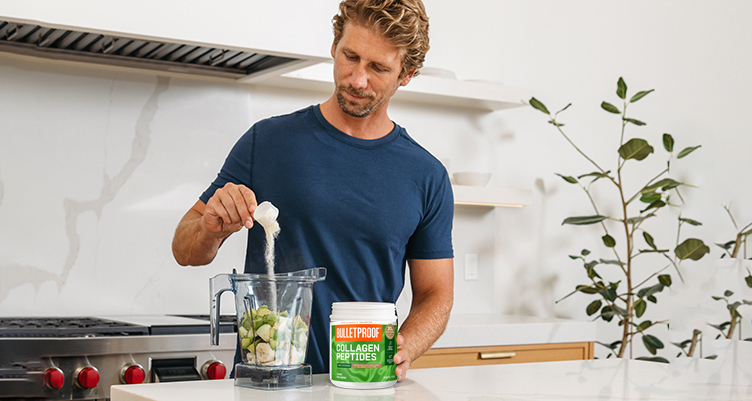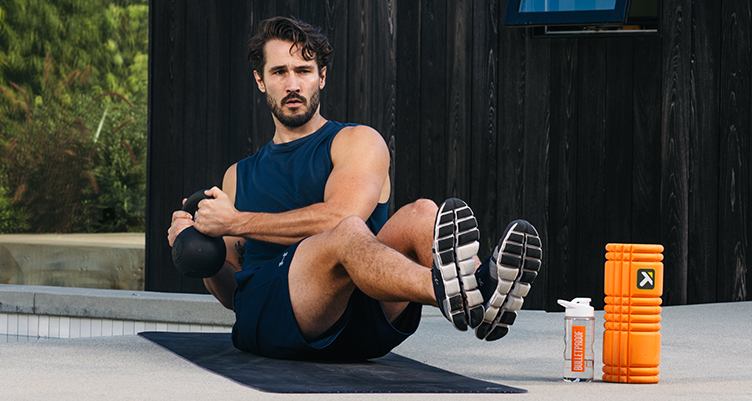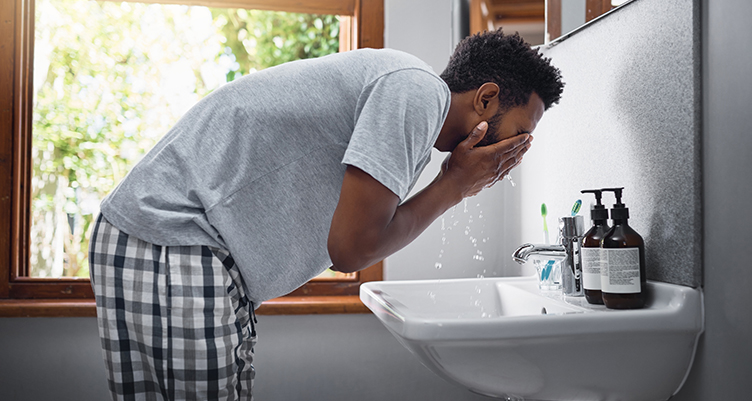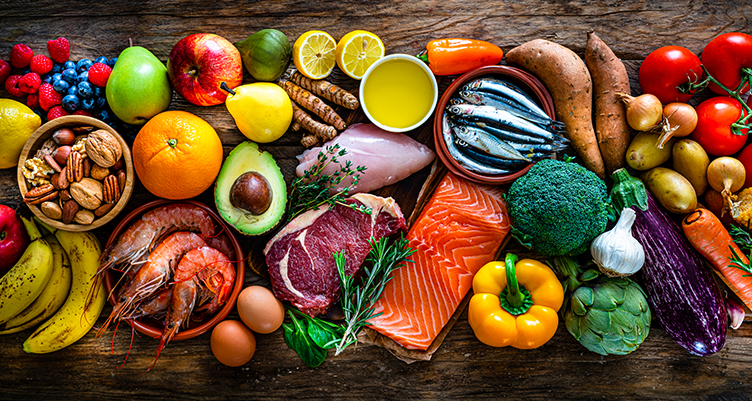Is Collagen Good for Men?

- Taking collagen benefits men of all ages.
- Collagen benefits for men include youthful skin, greater muscle tone and faster joint and muscle recovery.
- Collagen deficiency, or collagen loss, may be reversed with diet and supplementation.
Radiant, hydrated skin and healthy, silky hair. These are just some of the benefits that have made collagen a coveted supplement for women.
But since collagen is an abundant protein produced by all humans, it begs the question: Is collagen good for men, too? The answer to that is a resounding, “yes!”
Benefits of collagen for men include improved skin firmness, increased muscle mass and faster muscle recovery. Keep reading to learn about the importance of collagen for men.
What is Collagen?
Collagen is a protein that the body naturally produces. In fact, it’s the body’s most abundant protein, making up 30 percent of the body’s protein.[1]
It works with another protein—elastin—to form a scaffold that provides strength and structure to act as a glue that holds the body together (collagen makes up 80 percent of the skin).[2]
Collagen also plays a vital role in other structures, including:
- Bones
- Joints
- Connective tissue
- Blood vessels
- Cartilage
Collagen production starts to dwindle in a person’s mid-to-late 20s. Collagen-rich foods and collagen peptides powder can play an important role in supplementation.
Top Benefits of Collagen for Men

Increases muscle growth
As a protein, you can count on collagen for muscle growth.
In a 12-week study, researchers found that young men who combined resistance training with 15g of collagen peptide supplements daily experienced an increase in fat-free muscle mass compared to the placebo group.[3]
Another study looked at men with sarcopenia, which is age-related loss of muscle mass. During the 12-week study, 27 older men combined an exercise program with 15g of collagen daily. These men saw a significant increase in muscle mass and strength compared to the men who exercised but didn’t supplement with collagen.[4]
Metabolism support
Still wondering if collagen is good for men? The link between collagen and weight loss should help.[5] Like any type of protein, collagen increases satiety or the feeling of fullness, so you naturally consume fewer calories.[6]
If you’re trying to lose weight, your metabolism will also get a boost from collagen’s role in increasing muscle mass. More muscle mass and less body fat can lead to a higher metabolic rate.[7]
Speeds up muscle recovery time
If you’re big on pumping iron, you already know the importance of taking a rest day to prevent soreness. But as you get older, you may find that it takes longer for your body to recover.
While massage, infrared saunas and physical therapy can all help, adding collagen to your diet may be the post-workout nutrition your body needs.
A meta-analysis of 15 randomized control trials found that collagen peptide supplementation may speed up the recovery process from joint injuries and support joint function.[8]
Prevents wrinkles

Collagen benefits to the skin is one of the reasons the collagen supplement industry is expected to reach 7.98 billion by 2028.[9]
If putting together a skincare routine sounds tasking, take comfort in knowing that collagen supplementation is a simple and painless way of taking care of your skin as you age. It can improve skin hydration, may help to reduce the appearance of wrinkles, support skin’s firmness and keep the skin firm and taut. [10]
What causes collagen deficiency?
Losing collagen is a natural part of life. By 40, the body starts losing 1 percent of collagen per year.[11] This change is more prominent in women who begin to lose 2 percent of collagen per year after menopause.[12]
Exposure to free radicals through sun exposure and smoking also speeds up the rate at which the body loses collagen. Both smoking and exposure to UV radiation can cause collagen and elastic in the body to break down faster.[13] The telltale signs of this how up in the skin as wrinkles and saggy skin since these proteins are the ones responsible for keeping the skin firm.
Types of Collagen
While there are around 28 known types of collagen, the most common ones include type l collagen, type ll collagen, type lll collagen.[14]
Type I and III are the most naturally occurring types in the body—and the ones you’ll find in our Collagen Peptides.
- Type I: This is the most prevalent form of collagen, accounting for 90 percent of the collagen in the body.[15] It’s found in the bones, skin and connective tissue.
- Type II: This type of collagen is mainly found in cartilage.[16]
- Type III: Type III is similar to type I collagen in that it’s found in the skin, blood vessels and other tissues.[17]
Foods that Contain Collagen

It’s recommended that men and women take between 2.5g to 15g of collagen per day.[18] One of the best ways to attain this is through your diet.
There are many foods that contain collagen, but the primary ones include skin-on chicken, fish, and bone broth (our bone broth recipe makes it easy to slurp down the most bioavailable form of collagen). Any type of bovine or marine animal source that contains connective tissue can be a good source of collagen in your diet.
Additional collagen-rich foods to add into your diet include:
- Pork bone broth
- Sardines
- Egg whites
- Citrus fruits
- Berries
- Garlic
- Leafy greens
- Bell peppers
Collagen Supplements
Collagen supplements have also become a popular means of feeding your body the collagen it craves. But if you’re new to the world of collagen, you may be wondering, “Do collagen supplements work?” The answer to this is a resounding yes. Collagen supplements have been found to boost skin elasticity and hydration, improve joint health and increase muscle mass.[19]
These supplements are often made up of collagen peptides (also known as hydrolyzed collagen), which are small pieces of collagen protein that have been broken down so the body can better digest and absorb them.[20]
Bulletproof Collagen Peptides are packed with 20g of collagen that’s sourced from grass-fed and pasture-raised animals without added hormones.
Protein powder with collagen dissolve easily when mixed into hot or cold beverages, such as your morning cup of coffee or pre-workout protein shake. If you’re feeling ambitious, put on your chef’s hat and whip up a range of sweet and savory dishes with these simple yet delicious collagen peptide recipes.
Sign up for early access to sales, product launches, the latest Bulletproof news and more!



